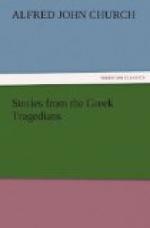“’Tis from proofs that I saw with mine own eyes, and not another’s, that I believe. Listen, therefore. When I came to the tomb of my father, I saw on the top of the pillar offerings of milk that had been newly poured, and garlands of all manner of flowers. And marvelling much at this, I looked to see if any man was at hand; and seeing none, I drew near; and on the tomb I espied a lock of hair newly cut; and as soon as I espied it I knew that it was a token of Orestes, dearest of men in all the world to thee and me. And as I touched it I held my tongue from all words that might do hurt, and my eyes were filled with tears. And now think whose should this be but his? Who should do this but thou or I; and I did not, nor thou, who canst not go so far from this house; and my mother is not wont to do such things. ’Tis Orestes surely. And now sorrow hath passed away, and all things will be well.”
“Nay,” Electra made answer, “I pity thee for thy folly.’
“Do not my tidings please thee?”
“I know not why thou talkest so wildly.”
“But may I not believe that which I have seen with mine own eyes?”
“O my sister, he is dead! Look not to him for help any more.”
“But stay. From whom didst thou learn this?”
“From one who was at hand when he perished.”
“Where is he? This is passing strange. Whose then could be these offerings on the tomb?”
“Some one hath put them for a remembrance of the dead Orestes.”
“Woe is me, and I made haste with the good tidings, as I thought, and knew not what new trouble worse than the old had fallen upon us.”
Then said Electra, “Hear now what I purpose. Thou knowest that we are utterly bereaved of friends, for Death hath devoured them all. Now, while Orestes yet lived and was prosperous, I hoped that he would come to avenge our father’s death. But now that he is dead, I look to thee, that thou shouldest make common cause with me and work this vengeance on them that slew him. Canst thou endure that we should live deprived of the wealth that was our father’s; and also that we should grow old unmated? For know that a husband thou shalt never have, for indeed AEgisthus is not unwise that he should suffer children to be born of thee or me to be a manifest damage to himself. But if thou wilt hearken to me, first thou wilt do that which is fitting to thy father and brother that are dead; and next thou wilt win great renown, and be married to a noble mate, for all men are wont to regard that which is worthy. And surely in days to come some man, citizen or stranger, that seeth us will say, ’Look, my friends, at these sisters, for they wrought deliverance for the house of their father, and spared not their own lives, but slew their enemies in the day of their prosperity. These must we love and reverence; these on feast days, and when the city is gathered together, must we honour by reason of their courage.’ Wherefore, my sister, be of good heart. Be bold for thy father’s sake and for thy brother’s, for mine also and for thine, that we may be delivered from these troubles. For to them of noble breeding to live basely is a shame.”




